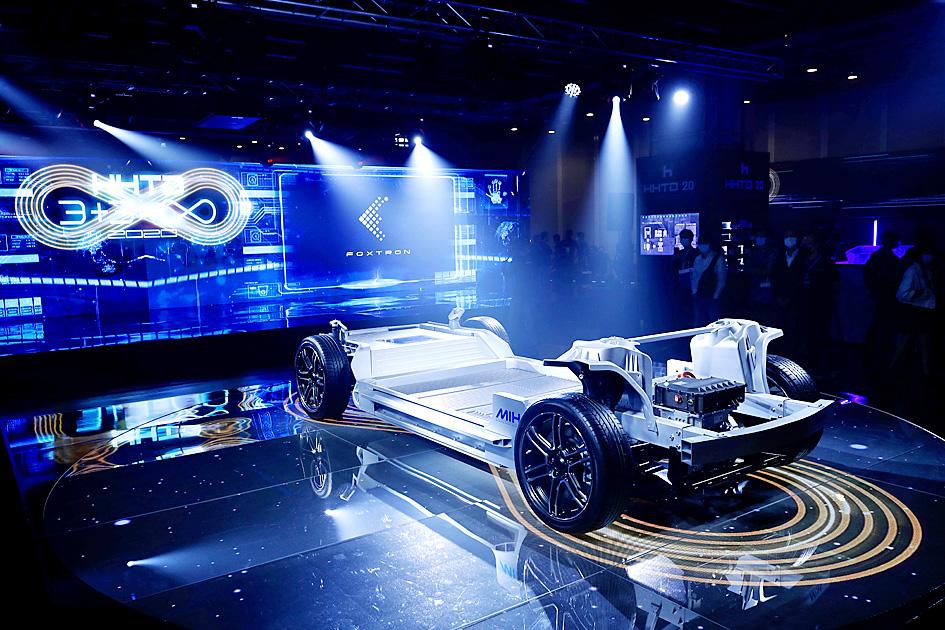Hon Hai Precision Industry Co (鴻海精密) and Chinese start-up Byton Ltd (拜騰) are stepping up cooperation in the development of electric vehicles (EVs), with reports that Hon Hai would station experts at Byton’s factory.
Chinese media on Saturday reported that Hon Hai would send about 100 engineers to Byton’s headquarters in Nanjing next year to help them move up mass production of its electric vehicles.
At a virtual meeting with Byton on Friday, Hon Hai chairman Young Liu (劉揚偉) said the company is not only eyeing the success of Byton, but hoping to capitalize on their partnership to make Nanjing a hub for electric vehicles, the reports said.

Photo: Ritchie B. Tongo, EPA-EFE
Hon Hai, Byton and the Nanjing Development Zone on Jan. 4 signed a strategic cooperation framework agreement to jointly accelerate production of Byton’s first model, the M-Byte, by the first quarter of next year.
“We are pleased to work with Byton to advance the production of the M-Byte. This will allow us to contribute to further growing the electric vehicle industry, a demonstration of our commitment to the transformation of the traditional automotive industry,” Liu said in a statement.
The company has been ambitiously eyeing a share of the electric vehicle market since Liu took office in 2019. It in October last year launched an open platform for electric vehicles for all stakeholders to utilize as they develop functional attributes and systems that would support market growth.
More than 400 companies worldwide have so far participated in the platform and Liu has said that the sector is looking promising for the first half of this year.
Analysts have said that global electric vehicle production would reach 4.58 million this year, up about 60 percent from last year’s 2.86 million.
Among those, 2.09 million are expected to be sold in China, compared with 1.21 million last year.

Application-specific integrated circuit designer Faraday Technology Corp (智原) yesterday said that although revenue this quarter would decline 30 percent from last quarter, it retained its full-year forecast of revenue growth of 100 percent. The company attributed the quarterly drop to a slowdown in customers’ production of chips using Faraday’s advanced packaging technology. The company is still confident about its revenue growth this year, given its strong “design-win” — or the projects it won to help customers design their chips, Faraday president Steve Wang (王國雍) told an online earnings conference. “The design-win this year is better than we expected. We believe we will win

Intel Corp chief executive officer Lip-Bu Tan (陳立武) is expected to meet with Taiwanese suppliers next month in conjunction with the opening of the Computex Taipei trade show, supply chain sources said on Monday. The visit, the first for Tan to Taiwan since assuming his new post last month, would be aimed at enhancing Intel’s ties with suppliers in Taiwan as he attempts to help turn around the struggling US chipmaker, the sources said. Tan is to hold a banquet to celebrate Intel’s 40-year presence in Taiwan before Computex opens on May 20 and invite dozens of Taiwanese suppliers to exchange views

Chizuko Kimura has become the first female sushi chef in the world to win a Michelin star, fulfilling a promise she made to her dying husband to continue his legacy. The 54-year-old Japanese chef regained the Michelin star her late husband, Shunei Kimura, won three years ago for their Sushi Shunei restaurant in Paris. For Shunei Kimura, the star was a dream come true. However, the joy was short-lived. He died from cancer just three months later in June 2022. He was 65. The following year, the restaurant in the heart of Montmartre lost its star rating. Chizuko Kimura insisted that the new star is still down

While China’s leaders use their economic and political might to fight US President Donald Trump’s trade war “to the end,” its army of social media soldiers are embarking on a more humorous campaign online. Trump’s tariff blitz has seen Washington and Beijing impose eye-watering duties on imports from the other, fanning a standoff between the economic superpowers that has sparked global recession fears and sent markets into a tailspin. Trump says his policy is a response to years of being “ripped off” by other countries and aims to bring manufacturing to the US, forcing companies to employ US workers. However, China’s online warriors